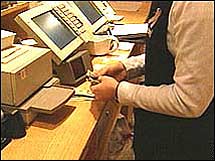January 03, 2007
Flex for Me
Via Ezra, the Wall Street Journal reports on a sparkling new computerized scheduling system being used by Wal-Mart, Radio Shack, and other retailers. The program will track customer habits, predict surges and lulls in store activity, and adjust worker schedules accordingly. It's good for the stores, which can now avoid having too many employees on the floor during down times, but some observers fear it could be hell on the workers:

But while the new systems are expected to benefit both retailers and customers, some experts say they can saddle workers with unpredictable schedules. In some cases, they may be asked to be "on call" to meet customer surges, or sent home because of a lull, resulting in less pay. The new systems also alert managers when a worker is approaching full-time status or overtime, which would require higher wages and benefits, so they can scale back that person's schedule.There's nothing wrong with computerized scheduling per se. In an ideal world the program would try to foresee when things will be busy and when they won't, and simply draw up a more predictable schedule. In restaurants, for instance, too many waiters often show up on slow days, in which case either someone has to go home or everyone has to split the lower-than-usual tip jar. If a computer could prevent this from happening, wait staff would benefit. But Wal-Mart, on the other hand, seems to be using the new system to put workers "on call" or limiting hours. That's very different, and exceedingly pernicious.
That means workers may not know when or if they will need a babysitter or whether they will work enough hours to pay that month's bills. Rather than work three eight-hour days, someone might now be plugged into six four-hour days, mornings one week and evenings the next.
Wal-Mart—like many other retailers—already demands that employees set aside large chunks of time each week to be available to work, even though they may only end up working a fraction of that time. To a lesser degree, this was the case in every retailer I've ever worked for: Workers had to be "on call" occasionally and got sent home if things were slow. Ideally, employees would get paid at least something for sitting at home "on call", but without bargaining power, they can't really demand this. They just suffer through the uncertainty instead. (Erratic scheduling also takes a nice little toll on one's health—an added bonus.)
Another problem, of course, is that 40 percent of Wal-Mart's employees will soon be part-time workers. Many of them—and many of the full-time workers, too—need to find second or even third jobs to make ends meet. Of course, it becomes near-impossible to find another job when you have to sit around "on call" and can't predict your schedule from week to week. Ah, but at least the Bureau of Labor Statistics can record an uptick in "productivity", and economists can then sit around and wonder why median wages aren't going up too. So it's all good...
Anyway, Ezra has the right take on this: Service workers need "the bargaining power and voice to demand--and receive--better treatment." Interestingly, back in the 1930s, many of the striking unions were concerned less with wages than with mistreatment at the hands of capricious and tyrannical employers. Of course, Harry Bennett's "servicemen," who would beat Ford factory workers for talking on duty, were a fair bit more odious than Wal-Mart managers poring over schedules, but the principle's basically the same.
